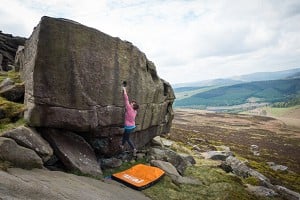
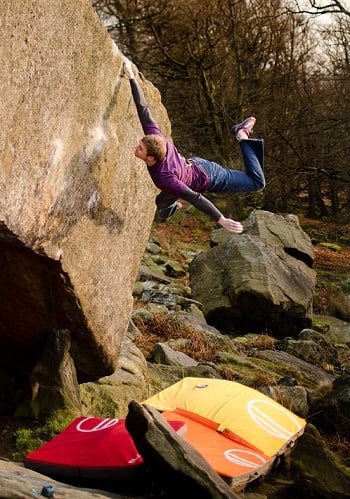
Ned: Yes I guess moving to Sheffield did influence my climbing quite a lot. I am from Leicester originally and although we had a great scene there it was nice to move somewhere close to so much rock and to be surrounded by really strong climbers who were always keen to train and get out. I was totally into climbing back then and i spent hours training at the wall or getting out in the peak. I learned loads and felt like I improved really fast in the first couple of years living here.
I met Dan (Varian) at Uni and climbed with him a lot. He was permanently motivated and burned me off all the time (still is and still does!) which was great as it made me bust a gut to keep up. I remember he got a car so we all piled in and went out climbing as often as possible. He was into highballing so that's what we ended up doing, ramming 4 or 5 bouldering mats in the little Cosra and rallying to the crag. I was usually totally out of my depth, too weak and too scared to do much but I learned a lot and it was a laugh. That time definitely opened my eyes to highballing – it suddenly made bouldering way more exciting and meant we could get a whole lot more mileage out of the local gritstone.
Jack: You are focussed directly on Bouldering right? What is it about this aspect of the sport that draws you specifically?
I never feel comfortable on a rope and this stops me from climbing at my best which can be pretty frustrating. I know where I stand on highballs and I can climb a lot better on them and therefore enjoy the whole process a lot more. Although I have done a little bit of trad over the years and enjoyed it loads. I really enjoy doing easier routes, but I guess I like to save the hard climbing for when I feel a bit more in my element, above bouldering mats.
I wouldn't say any of the highballs that I have done have been that dangerous. If things had gone wrong I might have broken some bones or something, but I don't think I have ever been in a totally grim life or death situation. I get way too scared for that!
Jack: Do you have any thoughts on highballing, gritstone and how the boundary between route climbing, bouldering and highballs all merges together?
The line between highballing and route climbing is pretty blurry and I don't really see why things need to be categorised as one or the other. Many routes could be climbed as either a highball or a route or as some sort of hybrid - highball the bottom half then put some gear in for the top. Personally I would rather climb things ground up above a sea of mats than headpoint them above a terrible landing. The traditionalists will argue that this spoils the character of routes. Fair enough, the challenge of the route is slightly different but it doesn't make it any less fun to climb. Or any less of a challenge, it's just different.
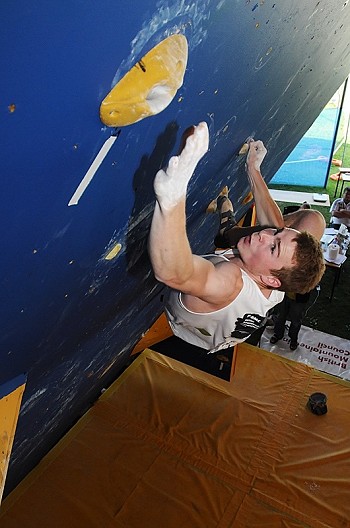
Jack: What have your most memorable climbing experiences been? And what do you look to get out of climbing?
In terms of achieving goals I think some of my more memorable days are from when I was younger and climbing was much more important to me. Doing classics like Brad Pitt and Deliverance for the first time was really exciting. And when I won the BBCs in 2008 I was buzzing for days. I just couldn't believe it. I think the older I get the less excited I am about the little goals, but the more I appreciate just going climbing with friends.
I really like the challenge of comps too. It's not that I want to be better than people or to beat people at all, I just love the way comps make you try so hard and the way you have to climb perfectly to do the problems. They are a great test of your overall ability which makes them a great motivator for training. It's satisfying to know that you climbed to your very best and tried as hard as you possibly could and whether you came 1st or 30th isn't really so important.
I think for many people climbing is a numbers game. People seem to want to prove themselves or show off how good they are by chasing some numbers and shouting about it to everyone else. That's fair enough, but it just doesn't interest me. It's great to see people climbing hard and getting stuff done, but it is a shame when they seem to be motivated by the tick in the box rather than the enjoyment of the climbing.
Also big grades often encourage bad boulder problems - things like link ups, lowballs and one movers, which are done for the sake of difficulty over everything else. Seems kind of lame. I want to hear about people climbing amazing lines and putting up new problems for others to try. That's inspiring.
I guess the difficulty of things is important to some people, and it's nice to see yourself progressing over the years but the closer you get to your limit the less you can quantify it. And amusingly, by going out of your way to tick a certain grade you're almost guaranteeing that the piece of climbing you eventually manage won't be that grade because you have found something that's easy, or suits you or whatever. The more I climb the less I understand how grades work so I have just stopped trying to get my head round it, or caring about it.
Jack: And what would you consider to be one of the ultimate boulder problems in the world - like a 'King Line'?
The comp scene in Britain is pretty small, there are only a few regulars but they are all very strong. I guess there is a distinction between those who focus on comp and those who focus on outdoors, but this doesn't mean the "indoor" climbers aren't good outdoors and don't get things done. Competitions and training for competitions takes up a lot of time but that doesn't stop comp climbers getting out and climbing hard. The 2 disciplines aren't mutually exclusive, they cross over really well. You get strong and fit for comps over the summer then you chill out over the winter and use your strength and fitness to get stuff done outside.
Comp climbing has a bad reputation in Britain. People don't really understand how hard it is to do well in comps. Anyone (almost!) can climb hard outside – especially if they have the time and money available to travel loads. It is so much harder to be a consistently good comp climber.
Personally I think some of my best achievements are my comp results. It is just so hard to get everything right, peak at the right time, stay light, read the problems correctly and not mess up when you're scared. You only get one chance but outdoors you can always just head back another day.
This season we have a really strong comp team and good support from the BMC. It looks like we could get some decent international results this year.
Ned: I am still involved with Beastmaker. It's been busier than we ever expected over the last year and we have been updating our production line to enable us to make enough fingerboards to fulfil the demand. We have some new products in the pipeline right now. They won't be available for a while as we are just so busy but we are plugging away at them bit by bit. There are only 4 of us in the company so it takes a long time get anything done, but we all really enjoy it and we are so proud of what we have achieved so far.
We have been working on a video about how the fingerboards are made. It shows the whole production process, from a plank of wood to a lovely fingerboard. I think it's a really interesting process – hopefully others will to! Keep your eyes peeled...

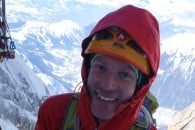

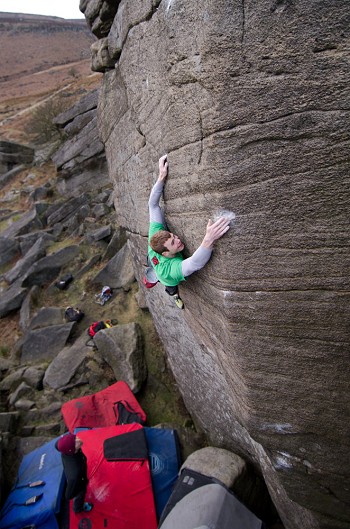
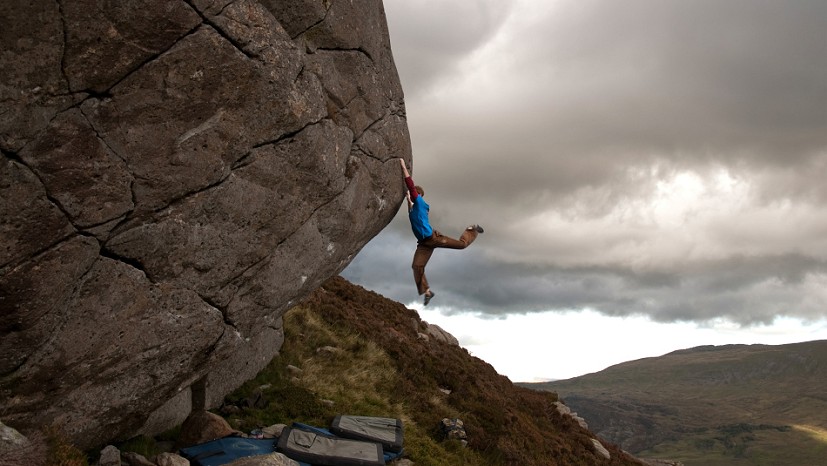
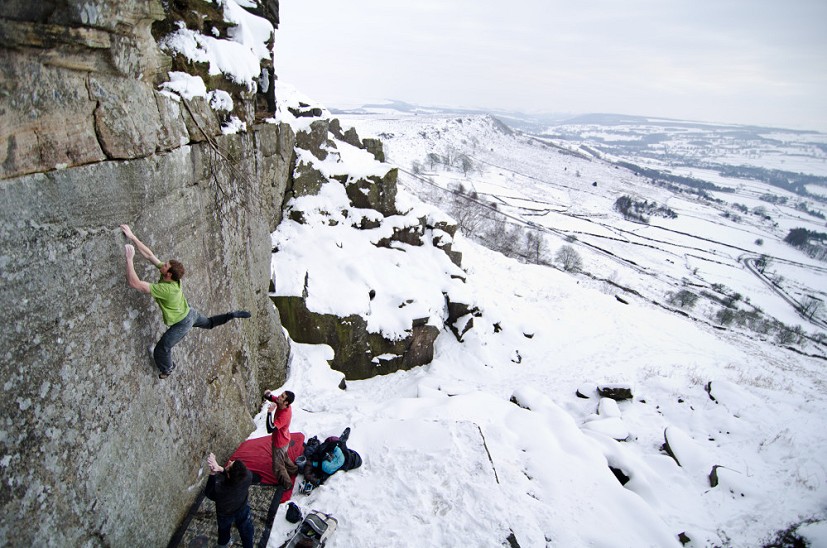

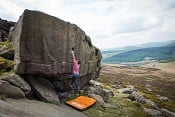


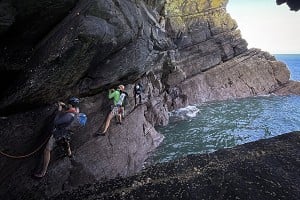






Comments